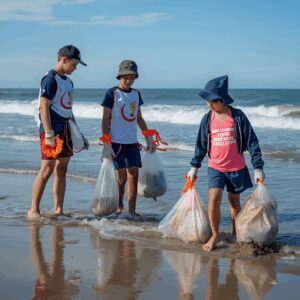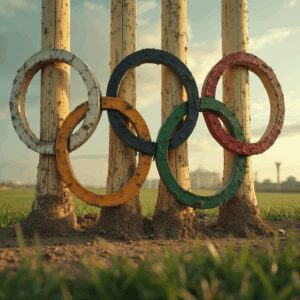OECS Swim Champs 2024 – SVG’s Facilities Challenges
Congratulations are in order for the St Vincent and the Grenadines’ third hosting of the ever-improving Annual OECS Swimming Championships. Once more the swimming associations across the OECS gave yeoman support to their St Vincent and the Grenadines’ counterpart, bringing hundreds of athletes, officials, parents and supporters together, in our beautiful country.
The nation’s array of relatively small hotels benefitted from the few days of consistent patronage thanks to the sporting spectacle over the weekend that added value to the nation’s economy.
On Friday 8 November 2024, the opening ceremony for the Championships could not compete with the inclement weather – thunder, lightning and lours-long heavy rainfall, eventually forcing a premature end to the evening’s component. On both Saturday and Sunday, the Championships suffered from intermittent but particularly heavy showers that posed immeasurable challenges to the organisers as well as the participating delegations.
Happily, though, the Championships were completed and the participants delighted that they were part of the continuing history of annual event, many adding their names to the growing list of medal winners.
The Championships over, it is important that we engage in some analyses that would benefit all of our sport loving people, sport administrators and those who lead and wish to govern St Vincent and the Grenadines.
Swimming in St Vincent and the Grenadines
We have, over the past several years eagerly followed the introduction, growth and development of swimming as a competitive sport in St Vincent and the Grenadines.
While, in many Caribbean countries, Swimming’s origins could be traced to the ruling class whites, all beneficiaries of colonialism, as was the case with Cricket, Tennis and Cycling, to name a few, this was not the case in St Vincent and the Grenadines. The pioneers of the sport in this country were not committed to one class nor did they try to develop the sport along those lines.
While there have been several persons involved in the history of Swimming in this country over the years, credit for the early survival of the sport rests with Rickydean Alexander, who sought out children and their parents, inviting them to get involved in the sport. He did this without a single national facility. Instead, he went around asking hoteliers and private individuals who had swimming pools, to allow him to get a programme going.
The eventual access to the dilapidated pool as Shrewsbury House proved to be a blessing. Attempts at transforming it into a pool in which competitions could be held proved challenging at first. Fortuitously, things came together as some interested persons came together as revitalised what was at the time a flagging national governing body for the sport. All this after the country was represented in the sport at the Olympics level in Sydney, Australia, 2000 and again in Athens, Greece, 2004.
At the Sydney Olympics, the two athletes, Teran Matthews and Stevenson Wallace, went directly from St Vincent with no regional or international experience. Four years later, the swimmer, Donnie De Freitas Jr., had the benefit of studying and training in Cuba, from where he left for Athens.
Swimming then experienced a major hiatus, and it was not until several years later that the sport experienced a comprehensive revamping that has since been sustained enough to facilitate consistent national team representation at the OECS, Carifta, Central American and Caribbean, Pan American, Commonwealth and Olympic levels. It should be noted that the newborn Swimming Association has produced, initially, a four-lane 25m swimming pool and later, a six-lane facility complete with change-rooms, pavilion and parking. It is the construction of their own facility that has enable the local governing body to successfully bid for and host the three editions of the OECS Swimming Championships that it has held.
Status Update
The SVG Amateur Swimming Association (SVGASA) has established itself, in relatively short time, as one of this country’s leading sport association and boasts strong, decisive leadership from a very committed Executive. The organisation has come a long way.
When the SVGASA first hosted the OECS Swimming Championships, not a single member of the government, not even the Minister of Sport, put in an appearance over the three days of competition. But things have changed, somewhat. There is strong support from the National Lotteries Authority.
Challenges
While some may hastily gravitate to suggesting that the fact of us hosting OECS Championships on three occasions may well hint at a move towards sports tourism at the national level, nothing could be farther from the truth. We have not yet begun to scratch the surface.
The nation’s largest hotel, Sandals Beaches, is also one of the most expensive we have. None of our existing sports can afford the luxury of hosting Championships with participating teams capable of meeting accommodation costs there.
Our country, whilst boasting of developing a strong tourism programme, lacks adequate hotel stock with affordable prices for national associations to dare to bid to host major regional and international competitions. This is not only in respect of swimming but for almost any major sport practised in this country. We are simply not yet ready for this.
Facilities
Then there is the matter of the actual sport facilities. Ideally, swimmers need to have access to a warm-up/training pool adjacent to the competition pool. This is essential to enable optimum performances on the part of the competing athletes. A single six-lane 25m pool, with no separate pool for warm up and training will simply not do for any major competition beyond the OECS.
Having only six lanes means that the organisers are compelled to have more Heats than should otherwise be the case, forcing the competition to drag on much too long to allow athletes to feel thoroughly recovered to deliver best times.
While records may be broken, the athletes would still not have been appropriately prepared to deliver their very best in competition.
The swimming pool at Shrewsbury House needs to be expanded to a minimum of eight lanes. The pool being only 25m long means that we can only host short-course Championships. This significantly limits the number of Championships we can ever hope to host. This also has major implications for our own athletes for whom this is the only facility to which they have access to train on a consistent basis.
The existing pool does not have adequate accommodation for patrons. This was very evident during the Championships that were held over the past weekend. Despite the rain, the crowds were strong in attendance and support. However, many could not be completely satisfied with the amount of accommodation on offer. The arena needs much more by way of seating. More seating means more gate revenue as well as at the refreshments areas.
Perhaps the most glaring deficiency of the existing swimming facility is the fact that it is uncovered. Over the weekend of the OECS Championships, once the rain came, and with it extensive lightning, the competition had to be stopped, guaranteeing the requisite safety standards required. Had the bad weather not been intermittent rather than sustained, the competition would probably have been cancelled with all delegations suffering major financial loses.
Finally, the swimming pool facility is not located near enough to any major population centre to prove an attractive proposition for parents keen on having their children take up the sport, seriously. Without easy access to transportation on a regular basis, interested athletes are immediately put at a disadvantage as opposed to those who come from upper-middle and upper classes. This reality is not what the leadership of the sport wants to see happen in a country like ours where we desire inclusion as opposed to exclusion, in sport as in life.
The future
For an island nation completely surrounded by water the future is simple. Swimming should be encouraged amongst all citizens, from birth, through to death. There should be a national commitment to teaching the population to swim and hence to be exposed to education and training in being able to swim, safely.
St Vincent and the Grenadines needs a proper, world class swimming facility that could actually be part of a much broader national sports tourism policy, enabling the sport the opportunity to successfully bid to host major Swimming Championships and even qualifiers for multi-sport competitions.
Swimming is generally seen as the #2 ranked sport for individuals in the world, after athletics. For small island nations, the sport should also be hugely popular but not enough effort is put into any sort of critical analysis of what is being done at home versus what the global sport environment is doing, where it is headed.
What we do need to understand is that what is happening in Swimming is consistent with the abysmal lack of planning that is the norm in Vincentian society. The idea of sport being important beyond the garnering of the youth vote is anathema to many of our politicians and leaders in the broader matrix that constitutes what we do in and with our national development.
For far too many decision-makers here at home, sport is still a recreational activity and nothing more. The blinkers are still on and serves to hinder any clarity of vision of a Vincentian future where sport, much like culture, could be integral to the nation. It is an unfortunate reality that St Vincent and the Grenadines developmental myopia, crafted as it is by a single individual who believes he knows all things and therefore determines all things that he currently has the power to control, will reign supreme and continue to speedily lead us down a path to nowhere.






